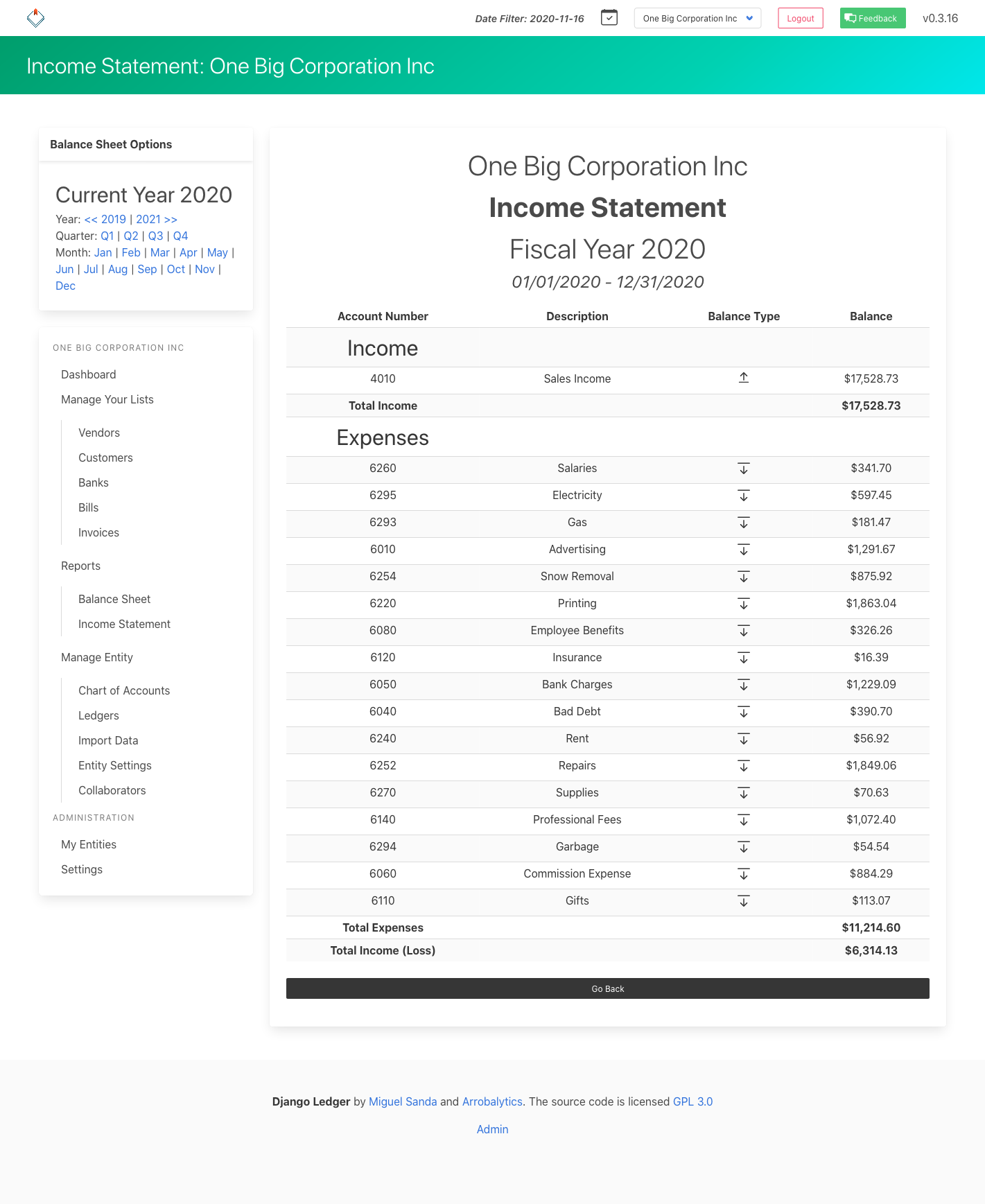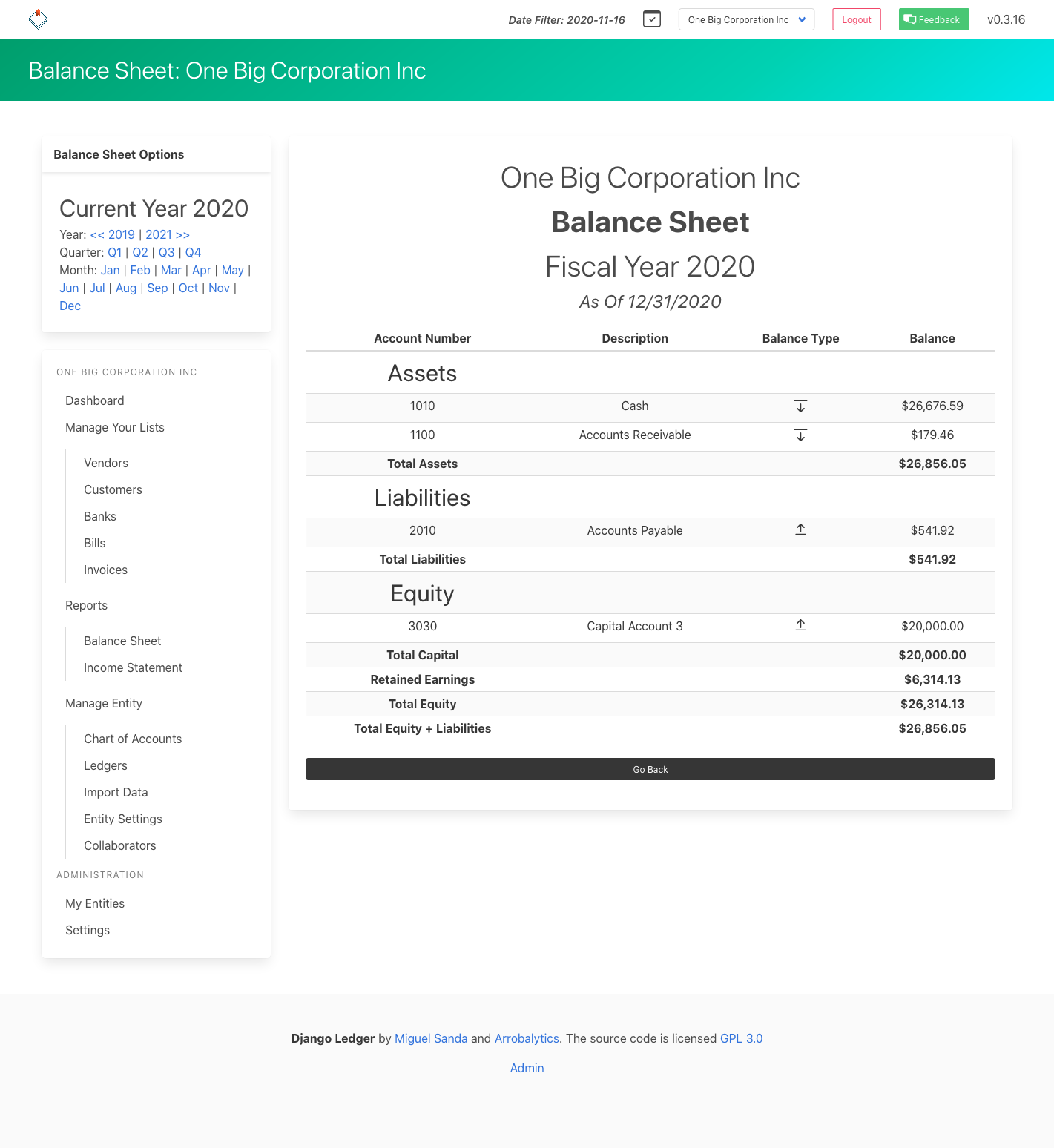Django Ledger is a double entry accounting system, which aims to power financially driven applications by removing the complexity of the accounting domain into a simple, high-level API.
Django Ledger was created and is currently maintained and developed by lead developer Miguel Sanda. If you want to contribute please consider joining our new discord channel here.
Join our Discord Channel Here
The software is still in early stages of development. For more information, please check the Roadmap.
Finance and Accounting is a complicated subject. Django Ledger is different from other Django projects as it aims to provide a developer-friendly accounting engine while providing a reliable and extensible API to power financially driven applications. This project in particular, not only requires Python AND Django programming experience, but also finance and accounting experience. So, that's the long way of saying, we need your help! Join our Discord Channel here to learn more.
This project can greatly benefit from contributions towards Documentation and Unit Tests. This is the best way to get started twith this project if you are not familiar with the models.
Access the latest documentation here.
Django Ledger supports:
- Double entry accounting.
- Hierarchical Chart of Accounts.
- Financial Statements (Income Statement, Balance Sheet & Cash Flow Statement).
- Purchase Orders, Sales Orders (Estimates), Bills and Invoices.
- Automatic financial ratio & insight calculations.
- Multi tenancy (multiple companies/users/clients).
- Hierarchical entity management (for consolidated financial statements - v0.9).
- Self-contained Ledgers, Journal Entries & Transactions.
- Basic OFX & QFX file import.
- Bills & Invoices with optional cash/accrual functionality.
- Basic navigational templates.
- Entity administration & entity manager support.
- Items, lists & inventory management.
- Unit of Measures.
- Bank Accounts.
- 0.4.0: Items, resources and & lists for bills & invoices itemization:
- 0.4.0: Enhance and optimize Django Ledger the random data generation functionality to properly populate relevant random data for testing.
- 0.4.1: Entity internal organizations, department, branches, etc.
- 0.4.2: Custom Accounting Periods.
- 0.4.3: Purchase Order Model implementation.
- Bugfixes & UI/UX Enhancements.
More details available in the Django Ledger v0.5 Page .
- 0.5.0: Inventory tracking.
- Average Cost.
- 0.5.1: Customer estimates & contract tracking.
- Link Estimate/PO/Bill/Invoice workflow.
- Journal Entry activity determination & validation (for cash flow).
- 0.5.2: Cash flow statement.
- Human Readable Journal Entry document numbers.
- Hierarchical Account Model Management.
- Generate all Django Ledger Model documentation.
- 0.5.3: Closing entries, snapshots & trial balance import.
- Chart of Accounts Import.
- Trial Balance Import.
- Closing entries and snapshots.
- Balance Sheet Statement, Income Statement & Cash Flow Statement API & PDF report export.
- GraphQL API.
- 0.5.4: Testing framework implementation that will include:
- Unit tests using the Built-in Django unit test modules.
- Behavioral Driven Testing using behave library.
- Need help!!!! If you want to contribute PLEASE ADD UNIT TESTS!!!
- Start creating basic package documentation via Sphinx
- Document code and functions within code base.
- Generate HTML documentation.
- Work with Accountants, Subject Experts and Developers to define an initial list of Unit Tests to validate output ( help needed!).
- Update package and code documentation.
- Bugfixes & UI/UX Enhancements.
- Credit Line Models.
- Time tracking.
- Transaction tagging.
- Update package and code documentation.
- Bugfixes & UI/UX Enhancements.
- Currency Models implementation as a way to define EntityModel default currency.
- Produce financial statements in different currencies.
- Update package and code documentation.
- Bugfixes & UI/UX Enhancements.
- User roles and permissions on views to support read/write permissions for assigned managers to entities.
- Customer jobs & job tracking.
- Client proposals & estimates.
- User preferences and settings & account creation views.
- Update package and code documentation.
- Enable Hierarchical Entity structures via MPTT.
- Consolidated financial statements.
- Intercompany transactions.
- Update package and code documentation.
- Complete Internationalization of all user-related fields.
*** Roadmap subject to change based on user feedback and backlog priorities.
This project is actively looking for contributors. Any financial and/or accounting experience is a big plus. If you have prior accounting experience and want to contribute, don't hesitate to contact me. See contribution guidelines.
- GraphQL API - See details here.
Django Ledger comes with a default CoA ready to use, or you could use your own. Make sure to select the appropriate option when creating new entities.
- Install Django Ledger
pip install django-ledgerTo install Django Virtual Environment
pip install pipenv
- Or with pipenv:
pipenv install django-ledger- Add django_ledger to INSTALLED_APPS
INSTALLED_APPS = [
...,
'django_ledger',
...,
]- Add URLs to your project:
from django.urls import include, path
urlpatterns = [
...,
path('ledger/', include('django_ledger.urls', namespace='django_ledger')),
...,
]- Add Django SuperUser if necessary.
python manage.py createsuperuser- Navigate to Django Ledger root view assigned in your project urlpattern setting.
- Use your user credentials.
Django Ledger comes with a basic development environment already configured under dev_env/ folder not to be used for production environments. If you want to contribute to the project perform the following steps:
- Navigate to your projects directory.
- Clone the repo from github and CD into project.
git clone https://github.com/arrobalytics/django-ledger.git && cd django-ledger- Install PipEnv, if not already installed:
pip install -U pipenv- Create virtual environment.
pipenv installIf using a specific version of Python you may specify the path.
pipenv install --python PATH_TO_INTERPRETER- Activate environment.
pipenv shell- Apply migrations.
python manage.py migrate- Create a Development Django user.
python manage.py createsuperuser- Run development server.
python manage.py runserverAfter setting up your development environment you may run tests.
python manage.py test django_ledger





